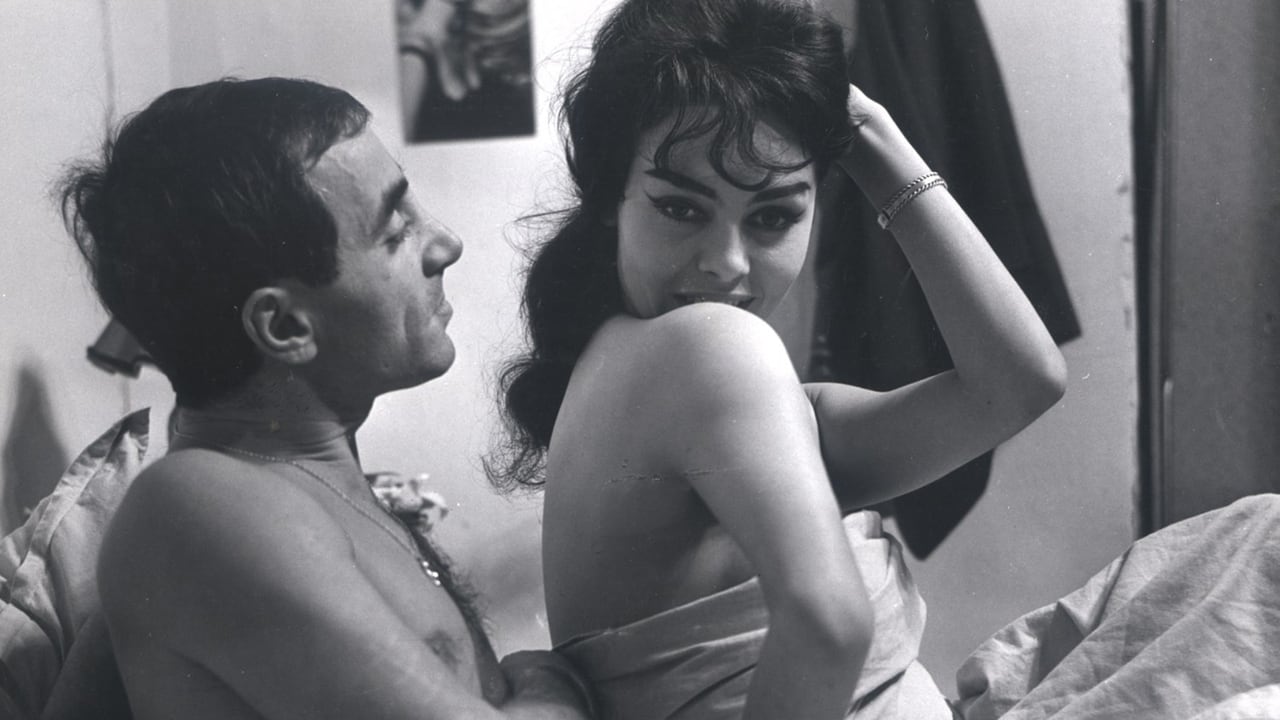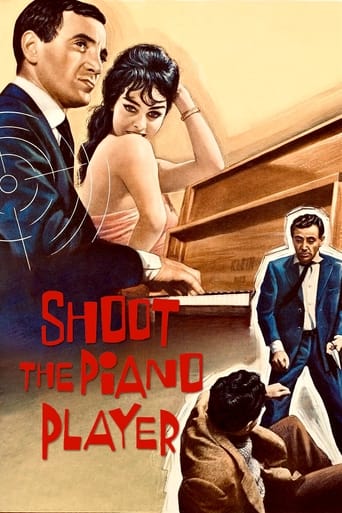

Why do we love the movies?This is a question that has been pondered by many, and it does deserve quite a bit of contemplation. Personally, I have come to the conclusion that all of the possible answers that lie beneath this general question can be found in Francois Truffaut's nouvelle vague masterpiece "Shoot the Piano Player".Its a silly and sad dance of despair and darkness through criminal underworlds, tragic pasts, and witty gags. There's also plenty of thrills, chills, loves, and laughs for an entire film festival. Jumbling all of these emotions into a single film sounds like a difficult task, but Truffaut is a master of his craft and understands how to make this tragicomic thriller really work. Using many of the most playful cinematic techniques he could muster, he guides the audience through the strange and, at times, borderline surreal world of "Shoot the Piano Player", a film that bursts with romance, humor, and melancholy. Its realistic and fantastic, funny and sad. All of those who love the movies must see it immediately !
... View MoreAfter the elaborate success of his debut Truffaut went into this film seeking to subvert and play with the noir archetypes, the Hollywood B-movies with the jaded, rough edged leading men, the despicable criminals, the sultry femme fatales. So the film shifts from the jaunty opening piano tune to a dizzying night-time chase; smash cuts push the headlights up into the running man, which then suddenly switches to a mundane conversation about the challenges of married life. There are no clear cut rules or boundaries here as the French New Wave dictates, so clichés get turned on their head. Charlie and Lena get picked up in broad daylight and driven to god- knows-where, but the conversation inexplicably turns into a humorous matter-of-fact spiel about the perils and madness of the women in their lives. See how Truffaut shoots this scene; the camera free-flowing and hand-held, capturing their giggles and jokes as if this was not a threatening kidnapping but rather young students on a summer road-trip. In Aznavour we have a timid, almost cowering leading man. He plays his cheerful piano at the local dive whilst the patrons dance away during the night of their lives and his face is curled up in the background, forlorn and miserable. This composition is not withdrawn and broody as it should be; in fact the humour comes from the irony and almost bizarre, slapstick contrast it creates. We see it again in the closing shots. Opposing this feeble lead are strong female characters; not ones that abuse and flaunt their sexuality, but thoughtful, vulnerable women who see past convention and are not so easily wooed. The most genuine and startlingly funny scene is Charlie attempting the simple act of trying to hold Lena's hand. This little action is ballooned up in his thoughts - he extrapolates everything and panics over the slightest reaction. His intrusive, gun-shy thoughts are not unlike our own - slowly weeding its way into our insecurities and making a big deal out of nothing. And then it is not anything he does, but rather the sheer physical embarrassment on his face that opens the floodgates and smiles. Another notable scene is his nervousness in pushing the bell to the door of the audition; Truffaut pushes into closeup more and more with each successive edit, then abruptly cuts to a wide shot of the hallway, showing just how tiny and insignificant he is. He shrinks instead of rising to the challenge. Would a noir ever apply this cut to its protagonist? What a cosmic farce Charlie lives in. He shows not the least amount of interest in the criminal affairs that he is nevertheless dragged in because of his family. The genre morphing from Truffaut has led him to become thoroughly confused about what sort of man he is and what sort of man he should be. Instead of comforting his despairing wife like his good nature tells (nags incessantly, more like) him to, he runs away coldly like a noir hero might, buffeted by his troubling thoughts. And he drags Lena back into the underground, and gets her killed in a meaningless affair. Nothing ever seems to fit nicely. The kidnappers again descend into comical nonsense as they debate many trivialities with the young Fido who should be terrified. Tinkling, light music invades the dark, grim night-scapes. Charlie is left once again to play his cheerful tunes. His face is etched in regret; how could he have gone wrong?
... View MoreFrancois Truffaut's Shoot the Piano Player is at once a tribute to American cinema and literature as well as a great example of the French New Wave and an insightful look into the relationship between men and women, a hallmark theme of Truffaut's oeuvre. The story, simply and meticulously told, is that of Charlie, a once famous piano player now hiding away with his talent in a dump of a French night club, attempting to run from his past and his family, both of which he would rather not be involved with. Unfortunately, fate brings both to his doorstep, most specifically through the actions of the beautifully fragile Lena, a waitress who loved Charlie but may not realize the danger she puts him in. What is really wonderful about this film is Truffaut's immaculate sense of place and memory as he showcases Charlie's feelings about his past and how he intends to face it. Utilizing many familiar New Wave techniques, including jump cuts, extended voice-over and a remarkably fluid camera that swings around and pans across so that we see everything possible, this is a tragic love story that also has time for multiple monologues describing how men view women and how women view men. Being only his second film, Truffaut was still feeling out this subject before he went full-force with 1962's Jules and Jim. Here, it feels quite tender and moving; almost as if Truffaut himself felt a little uneasy about discussing this. While not as mature as some of his other works, this is still a modestly entertaining and interesting tale about what Truffaut was all about: love, memory, the ethereal nature of women and how all of it is connected in life.
... View MoreMay be i expected more from this flick....but it started like a comedy,slowly into a melo drama with more plots added to the film. the suspense factor wasn't there though it had his moments..but the main disappointment for me is sometimes the characters weren't aware wat happening around them.... the protagonist didn't care of his rico(if i am correct) his brother child was with the gangsters..at the time he doesn't care abt him,but instead he thinks of philosophy and all...its out of normal to me. but a brilliant camera works..some dialogues was funny...truffaut did with what thought i cant understand.. i read review saying great movie. but it falls short not being great or bad movie.... not tat much recommended i give 6 out of 10...
... View More